#my second linguistics essay of the day. how fun (/s)
Explore tagged Tumblr posts
Text
Life, death, and rebirth – developing and redeveloping a personality on a progressing timeline
So. I had a little fun today. The last task on the psychology course was to write an essay on personality development based(ish) on Mischels theories about personality development. The guidelines were a tad loose, and I choose to run with it. The text below is what I submitted, hopefully I’ll get som feedback on it tomorrow or in a few days and I’ll keep you posted on that. :D //Jimmy How does one begin to describe, in any relatable fashion, the development of one’s personality, especially as it is a work of perpetual process? One must, I assume, begin at the beginning: I was born. Then there was nothing until I developed a basic sense of self awareness and the ability to define myself in relation to other people and objects. In that very moment I created the world; but you may rest easy, for I am a humble god. Especially so since I stopped demanding the immediate satisfaction of my basic needs and allowed myself to be shaped into this present form by the mold created by my parents and by society; by boundaries drawn by cultural and linguistic traits Thus, like the Christian God I was made flesh and blood – now writing before you as this maculate conception, ever learning as I progressed over the years, constantly striving to fill out this rudimentary sketch of “me” drawn by my parents with ever more content and subject matter. I learnt of poetry and philosophy – the power of word and thought, and thus, in my late teens, I entered a new phase. Let it begin with these words from the gospel [abridged] of St. Charles the Inebriated.
”Born like this
Into this
Into these carefully mad wars
Into the sight of broken factory windows of emptiness
Into bars where people no longer speak to each other
Into fist fights that end as shootings and knifings
Born into this
Into hospitals which are so expensive that it's cheaper to die
Into lawyers who charge so much it's cheaper to plead guilty
Into a country where the jails are full and the madhouses closed
Into a place where the masses elevate fools into rich heroes
Born into this
Walking and living through this
Dying because of this
Muted because of this
Castrated
Debauched
Disinherited
Because of this
Fooled by this
Used by this
Pissed on by this
Made crazy and sick by this
Made violent
Made inhuman
By this
[…]”
Charles Bukowski – ”Dinosauria, We”.
Now, I may not have turned out quite as bitter and fatalistic as the aged Bukowski, but I do confess to a certain faiblesse for the absurd, in Camus’s use of the term, that existence is without meaning and purpose, and that beauty lies in –the absurd– meeting between this knowledge and continuing to striving too, despite this knowledge, fill life with love, beauty and personal meaning.
I was born into a classical working class home at 09:28, December 25th 1974, the first child of a young mother and an alcoholic and controlling father; two parents that had the unusually common sense for their time to realise that they should not be together, and thus early becoming a child of separation – my parents were not married. I was doomed to the life of bi-weekend migrations between families – as this was long before the enlightened era where parents manage to handle child care in an adult fashion and share the weeks equally – a conduct that, in my case, created a feeling or rootlessness and a sense of drifting rather than establishing solid connections within either family – my mother and my father’s new families respectively. This rootlessness in turn created the foundation of a lifelong fear of abandonment and also of a shyness that manifested itself in an extroverted way – acting like the class clown, hiding emotions behind first erratic behavior and later, as I grew older and developed an arsenal of wit and amassed at least a modicum of knowledge – in early attempts at humor. I also developed the foundation of a contrarian mindset that is still present to this day. I despise the consensus – mainly because a consensus promotes a lack of progress and a lack of progress is the base definition of death. However, when I was a child the main reason for causing disruption, even if I was not aware of it at the time, was that it is easier to hide where there is disorder. Being judged by one’s behavior was far more preferable to being judged on who I actually was.
It was at this age, around the age of seven or eight, that I came to the conclusion that religion was not the answer. Being introduced to a light version of Christianity in an after-school setting, being taught the core concepts of the New Testament, I promptly told the teacher that it was nonsense and, if I recall correctly, was not invited back for the second semester. Much to my mother’s dismay, I presume. By this time, we had left Uppsala and moved out into the countryside, a move that lead to an increased isolation on my behalf – this suited me perfectly as my main interests, especially as I started fourth grade, turned into literature and music. My mother had always read out loud for us when we were little, and I have always had a strong imagination – making the immersion into literature both smooth and welcome. Music also became an important present at this early age – literature and music has followed me ever since. The main part of the eighties was spent in my room reading and listening to music.
What beautiful time it was.
Reading has had a huge impact on the forming of the person that I am today. All adults that I was surrounded by, in a formative sense – part from teachers – lacked any higher education and we did not really discuss much at, particularly not on my mother’s side, where I spent most of my time. My father, on the other hand – and this is based on long term memories, I cannot vouch for the validity of these memories as I have not spoken to the man in over 20 years – had a creative side – he tried to keep up to date, enjoyed certain intellectual activities. And whisky. And to listen to music. And whisky. And occasionally to beat his kids. Personally, I can’t remember to have ever being beaten by him, that seem to have developed later. My two brothers on my father’s side got to take the brunt of it as I can remember, however – he also had a knack for the words and was happy to share his opinions on how useless we were. That one has stuck with me. As I grew up and became older, and also stronger, this abuse increasingly became a greater and greater problem for me – culminating in me eventually starting to step between my father and my younger siblings when he got ”into the mood”. Eventually, however, I came to the point where I could not keep doing this and as I neared adulthood the relationship with my father and also my father’s side of the family slowly ebbed out. Initially, and for some years I felt that I had let my siblings to fend for themselves, but that feeling is long since passed. I have processed this, and I have moved on. It had to be done.
I once asked my mother why they did not put any pressure on us when we were younger. Why they never pushed us to do better in school or had any opinions on what we choose to study in high school. The answer was that they wanted to let us choose for ourselves, that we should study what we wanted. The guidance counselor, I remember, told me to look find a job in a warehouse. Packing vegetables at the COOP. The direct result of that was that I ended up studying for two years to become a bricklayer. I had no ambitions. I choose what I knew, since my stepfather and my father both worked in construction. I should not have been there. My only proper skills after being through the Swedish school system in the 80’s and early 90’s was a decent grasp of English. There were no jobs for me in construction, nor would I have been interested if there were any. If change was to come it was not through family, the school system or anything else. It was through me.
Looking back, however, it is interesting to see how much my life has been formed from the experiences of these formative years. I have no friends or acquaintances from before I started studying at university for the first time in 1998. Non whatsoever. I was social, I had friends – but I have never been sentimental – and I would rather let friendships run out from time or distance. No strong ties, no risk for emotional trauma. One might say that I started to reconstruct my life in my early twenties, I got into a new profession, I applied and got accepted into Grythyttan, Sweden’s premier hospitality industry education, a higher education under the management of the university of Örebro. This pretty much meant everything. Getting away from Uppsala and then – by the slight detour of three years in Grythyttan – to Stockholm meant everything. There is a reason why the Stockholm tends to draw people to it: the chance to rebuild yourself, to turn you into the person you want to be, to let yourself take center stage, if you will. Those were the formative years. They were great years. Working in the restaurant business in Stockholm in the early 2000’s was a smorgasbord of hedonism; food, wine, spirits, drugs. The sky was the limit. What a time to be young. And had not an underlying feeling that there must be more to life kept on nagging me I’d probably still be there today, standing on the brink of being a burned out wreck – but instead I got out, I diversified and got into wine import, into copywriting, photography – always searching; and I think that I am finally starting to get an idea.
I woke up one morning in December 2018, taking stock of my life. What I had done, where I had been, where I was and what I wanted to do. The same day I applied for a late admission course at Södertörn and started studying the very next month. I am very curious to see where I will end up.
10 notes
·
View notes
Photo
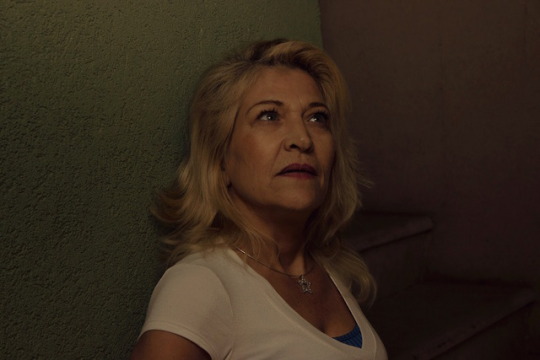
Focusing a New Lens on Mizrahiness
“Generation(s) of Levantines” by Leeor Ohayon
view the accompanying documentary photography series following the essay
“What exactly are you trying to capture? Which community? There just isn’t such a thing as Mizrahi,” my interviewee told me shortly. He had a point; what on earth was I trying to document?
Being of mixed Moroccan and Adeni heritage and having attended Jewish schools in London all my life, I became very much aware of the erasure of Mizrahi and Sephardic Judaism in the public realm. Jewish studies at school were conducted around an Ashkenazi-centric reading of history that began in Warsaw and ended with the Khurva synagogue in Jerusalem. Israeli Independence Day was celebrated with Klezmer music in the auditorium and dry falafel for lunch.
Mizrahi histories and cultures have been sacrificed at the altar of a collective Jewish imagination. That is to say-- our understanding of Judaism and Jewish memory is always conducted through the Ashkenazi experience, by Jews and non-Jews alike. The Ashkenazi label has become the default face of Judaism and Jewishness, and consequently is often found interchangeably replaced with just “Jewish.” Non-Ashkenazi cultures, in comparison, are hyphenated, asterisked, and put in boxes-- if not shelved entirely.
Perhaps that’s why heading to Israel to document Mizrahim proved to be my own Mizrahi education. I was confronted by the fact that my understanding, despite seeing myself as well versed in Mizrahi history, was coloured by my experience as a Mizrahi in the UK. Ashkenormativity alienates Mizrahim everywhere, but in Israel there is an entire political and social commentary surrounding this subject that often feels absent in the West.
When my interviewee asserted to me that there’s no such thing as “Mizrahi,” he was technically right. Mizrahiness is what professor Ella Shohat referred to as an “imagined community” borne of interactions with Ashkenazi Israel that ethnicised Mizrahi Jews.
So vast is the cultural, linguistic and geographic space that Mizrahi groups occupy that no single aspect could be said to be the unifying factor between them. Neither as followers of the Sephardic rite - Yemenite Jewry proving an exception to that - nor as hailing from a geographic East – for example in the case of North African Jews - and neither in a common lingua franca, like Yiddish for Ashkenazi Jewry.
Rather its formation merely owes itself to the fact that as Jews hailing from Islamic majority places, they endured a shared destiny as non-Ashkenazi Jews in an Ashkenazi state. They went from simply being Jews in their countries of origin to being Mizrahim in Israel.
There are many things to consider while photographing a subject as vast as Mizrahi identity. I had to account for the variation within it in my work, so I held many interviews across the country, with Mizrahim of all stars and stripes and all walks of life, in an attempt to better understand how to capture Mizrahiness.
When I asked my interviewees to point me towards what they considered as Mizrahi, I was told repeatedly to “go to the periphery”. The simple reason being that in the Israeli “periphery-” the localities of the north and south historical “frontiers” that lay outside the economically prosperous stretch of Israel’s central belt cities, I was to find “authentic” Mizrahiness like it “used to be.” Supposedly, unlike the residents of the Gush Dan metropolitan area, the inhabitants of this stretch of land were not altered by “modernity”.
In this assertion, the interviewees implied (perhaps unconsciously) that Mizrahi traditions and modernity could not be reconciled. The subtext was that to be “authentically” Mizrahi meant to exist outside of modern society. Aside from the fact that the quest for cultural authenticity is futile, many had used the same orientalist tropes that have historically been used to reduce Mizrahim to exotic folklore at odds with modernity.
Such a notion is as old as Zionism itself, which initially relegated historic Mizrahi and Sephardi communities in Eretz Yisrael outside of an Ashkenazi reading of history. A Jewish “return” to a “land without a people” was fundamentally an Ashkenazi return that refused to recognise that a society of Jews and non-Jews alike already existed in historic Palestine.
Likewise, the Ashkenazi establishment belief that Mizrahim were “primitive” and “backward” ultimately led to the disastrous housing policies of the 1950s and 1960s that forcibly placed Mizrahim across volatile front-line borders and empty desert expanses, on the basis that their supposed naturally “primitive state” could withstand living in such harsh conditions without modern comforts and standards.
Those spaces that Mizrahim settled in became the Israeli periphery of today, which remains etched into the minds of many, including those I interviewed, as spaces outside of modernity.
And yet there is something to be said for the “periphery” as a space that has protected Mizrahi identities and cultures. Particularly when the outskirts of Ashkenazi population centres are also taken into consideration- for instance, Tel Aviv’s southern districts or Jerusalem’s Musrara and Katamonim neighborhoods. These Mizrahi-majority areas served as incubators of a new ethnoreligious identity in Israel.
Mizrahi settlement in the ma’abarot (transit camps) and then in the moshavim (agricultural communes) and development towns that replaced them resulted in historic cultural and societal upheavals.
A break from the Mizrahi past in the diaspora was signaled on two levels, firstly, in Mizrahi settlers’ interactions with their new co-inhabitants that hailed from across the Muslim world; and secondly, in their interactions with the structures of Israel’s Ashkenazi-dominated bureaucracy- through its education system, the military, the employment service and so forth. These interactions took place against the backdrop of Mizrahi isolation from their countries of origin, given the lack of diplomatic ties between Israel and many Islamic and Arab states. The result of this discord is that successive generations of Mizrahim have been raised in a reality where their cultures have gone from being part of a two-millennia-old conversation with the broader region they inhabited to being relegated to the private spheres of home and synagogue within a culturally ‘western’ society.
It is precisely within these interactions with the state and against this backdrop of isolation that a new Mizrahi identity had begun to form on the margins of Israeli society. The subsequent result was an intra-Mizrahi conversation that has resulted in everything from a political consciousness to the birth of Mizrahit - a musical genre rooted in the experience of Mizrahi Jews in Israel.
One of the most apparent symbols of this cultural development is the modern Mizrahi attitude toward pre-wedding henna ceremonies: rituals that many interviewees had told me to avoid capturing for its lack of “authenticity” and as a worn cliché of Mizrahiness.
I shadowed henna planners and tagged along with them to wedding halls and synagogue basements across the country. Each time, I was greeted to a scene that evoked equal feelings of dismay and fascination. Hennas were conducted according to Moroccan cookie-cutter templates regardless of whether the participants were actually Moroccan or not.
I was told that the general gravitation toward the Moroccan tradition arose from the “fun costumes” and “lively atmosphere.” As the second largest Jewish ethnic group in Israel, Moroccans undoubtedly have left their mark on the nation’s collective cultural imagination. But the Moroccan way is also attractive, as one event planner pointed out to me, because many families want to host a henna ceremony but simply don’t know where to begin, as so many traditions were lost in the course of immigration and assimilation into Israeli society.
The modern resurgence of the henna ceremony owes itself to a growing movement of Mizrahi expression in Israel -- one that is increasingly vocal and unabashedly shameless. Yet it still reflects the literal Hebrew meaning of the word mizrah (east). It’s as though Mizrahiness is precisely just that - a smorgasbord of the East.
I witnessed a Moroccan-Yemeni couple split their ceremony in half allocating equal time to conduct a Moroccan henna and the Yemeni equivalent, a za’afa. I saw an Ashkenazi mother-in-law sitting in Moroccan dress at her Persian soon-to-be daughter-in-law’s henna, while the Persian grandmother sang in Farsi to the mixed crowd. I directed and photographed a henna photo shoot for a wedding magazine with sexed-up traditional dress. I witnessed things that can only be called pan-Mizrahi.
The act of carrying out a henna is perhaps one of the greatest testimonies to the perseverance of Mizrahi cultures and the simultaneous formation of something new. Hennas today pay tribute to a diasporic past that Israel’s founding fathers wanted forgotten in their quest for a Jewish Israeli national consciousness; they boldly pine for a different, newer Israeli identity, one better rooted in its geocultural neighbourhood.
In many ways, that pan-Mizrahi conversation is the closest resemblance to the vision of the unsung essayist, Jacqueline Kahanoff. Kahanoff was a French-educated Egyptian writer of Jewish Iraqi and Tunisian descent who proudly declared herself a Levantine when Israeli statesmen warned of the social and cultural “perils” that such an assertion could bring to Israeli society. In her essays, Kahanoff asserted that Israel should do its best to view waves of Jewish migration as an opportunity to formulate a new Levantine identity- one that emphasised integration with the region’s Arab communities. She named her philosophy Levantinism, and it is for her series of essays outlining this vision that this project is named.
While Kahanoff’s ideal has not necessarily come to fruition in Israel, a form of Levantinism has arguably manifested amongst Mizrahim.
On my journey, I also headed to a number of Israel’s heritage centres; small memorial-like independent museums that preserve the memory and traditions of Jewish communities from Aden to Kochi. A forty-minute bus ride from Tel Aviv takes you to the town of Or Yehuda, where both the Libyan Heritage Centre and the Babylonian Heritage Centre for Iraqis are found, separated only by a small stretch of road. The former, unlike the latter, is more austere and modest in appearance, but both heritage centres make an avid point of retrofitting Libyan and Iraqi Jewish histories within the Zionist narrative. Both heritage centres emphasised Jewish persecution under Arab Muslim rule and Mizrahi loyalty to the Zionist movement.
I was given a tour around the Libyan Heritage Centre by a guide who spoke of her own family’s suffering in the overlooked Libyan Holocaust. Few are aware that Libya, under Italian colonial rule, hosted the Giado concentration camp in which 562 Jews perished.
My guide relayed a real sense of frustration at Israeli society’s marginalisation of the Holocaust chapters that affected Jews in North Africa and the Balkans. “Why? Because we didn’t lose enough people?” she asked me.
Recognition of the Holocaust that blighted the Libyan community is a historical wrong that needs addressing. Its prevalence today is reflected in the fact that, in Israel, Holocaust remembrance has all the trappings of a civic religion. The memory of the Holocaust and the narrative of the Ashkenazi Zionist “pioneer” were core facets of Israeli identity building and the development of a collective national memory, and it is precisely due to the centrality of both such narratives in the Israeli national pantheon (at the expense of others) that Mizrahim have long felt shut out.
In the heritage center, as we toured countless rooms of wax figures clothed in regional Libyan dress, my guide reiterated the fundamental contribution of Libyan Jews to the Zionist movement, stopping by a series of black and white photographs to discuss Libyan involvement with Zionist youth groups. The role of Libyans in such groups was emphasized throughout the tour. Furthermore, the reiteration of Mizrahim as ardent Zionists was relayed to me in most of the heritage centres I visited and by many second-generation Mizrahim.
The centrality of the Ashkenazi “pioneer” to Israel’s founding story and the Mizrahi erasure within it have left successive generations of Mizrahim striving to be seen as equal partners in the Zionist project. It is that feeling of exclusion in particular, as many interviewees explained to me, that constitutes the origins of stereotypes like the Mizrahi vote for right-wing parties or the Mizrahi person who holds hawkish anti-Arab sentiments. The stereotypes echo the same historical processes that forced Mizrahim to prove themselves as loyal Israelis and to emphatically differentiate themselves from Arabs.
The desire to be written in as equals in the story of Israel’s founding is understandable; Mizrahim did partake in some of the most grueling aspects of state building. However, at the end of the day, the Zionist project was conceived as an Ashkenazi response to European antisemitism.
Devoid of the urgencies that Ashkenazi Jews faced in Europe, Zionism was unable to take root in the Arab world to the same effect. Members of the older generation, for the most part, were comfortable and secure in their homelands. In 1940s Iraq, for example, Zionist emissaries wrote of their despair in Iraqi Jews’ lacking resonance with Zionism. Zionism’s entrance into the Arab world was via the youth, offering Hebrew language classes and opportunities for the young to socialise, and even then only very modest numbers decided to immigrate as a result of Zionist ideals.
Rather, the reasons behind Mizrahi migration and flight are as complex as they are varied, taking place over a long period, from 1949-1979, continuing well into the 1990s. While state-sponsored discrimination was evident in Iraq in the late 1940s, it was the bombing of the Masuda Shemtov synagogue in 1951 - suspected by some to be the work of the Zionist underground - that truly propelled migration. In the case of the Moroccan Aliyot of the 1960s, Jewish emigration owed itself largely to the efforts of Zionist emissaries able to monopolise on the widespread uncertainty over the future following decolonisation and the Arab-Israeli conflicts, as well as genuine religious devotion. In Yemen, immigration owed itself to Messianic fervour and dire economic straits. And in some places, the reason for departure was explained to me as simply as “everyone was leaving, so we did as well.”
And yet the battle over Mizrahi memory continues. The same year of my arrival in Israel, the government declared the first Memorial Day for “the Departure and Expulsion of Jews from Arab countries and Iran” on November 30th. Mizrahi activists in Tel Aviv explained to me that such a holiday effectively rewrote history, asserting a single, rather than accurately pluralistic, narrative of Mizrahi flight and persecution. In doing so it pushes the idea of a “Jewish Nakba” which acts as a sinister counterweight to Palestinian displacement, while simultaneously asserting to Mizrahim that the key to being equal partners in Israel’s national memory is only through a narrative of eternal victimhood.
At the end of Passover, I headed to the Moroccan-majority development town of Yeruham to witness a “proper Mimouna.” I was enticed by the Moroccan pride I saw on display, moving between houses where front doors were left open for people to come and join. I was able to witness the essence of a Mimouna I thought lost in Israel’s big cities, warmed by the genuine hospitality of open doors that could only stay unlocked in a trusting environment.
The desert air and the individuals I met left me with a feeling that I had to return and spend a lengthier period in Yeruham. And so I did. I quit my part-time job, packed my bag, and headed down south in a move that baffled many people around me as I followed those endless cries:
“Go to the periphery.”
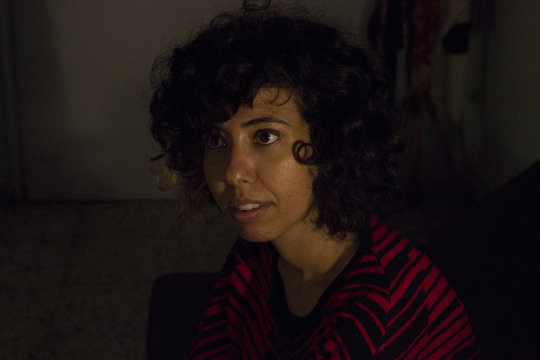
Adi Keissar, poet and founder of Ars Poetika, a Mizrahi and female-friendly poetic space in a field traditionally dominated by Ashkenazi men. Kerem-ha-Teimanim, Tel Aviv, 2015.

Interviewees in a Moshav Yinon, a Yemenite-majority agricultural village in central Israel, 2015.
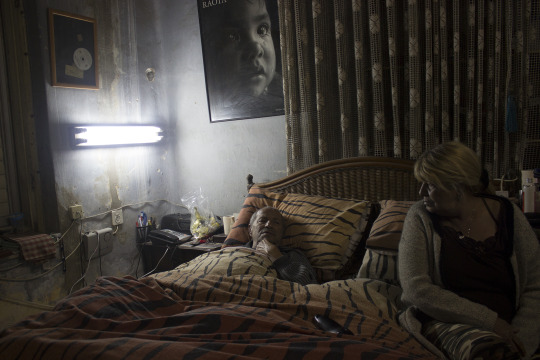
My great-uncle Moshe Meshumar. He was part of the Shubelim band, one of the earliest players in the formation of Mizrahit music, a genre that combined electric guitars with Arabic, Turkish, Greek and Yemenite elements sung in Hebrew. Shabazi, Tel Aviv, 2015.
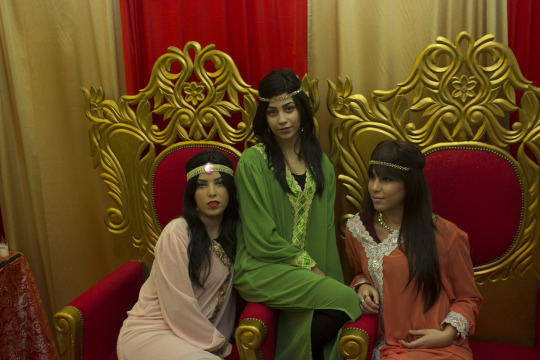
Girls dressed up at a Moroccan henna ceremony. East Jerusalem, 2014.
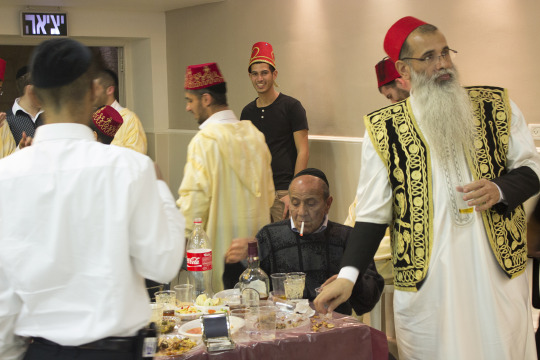
A Moroccan pre-wedding henna ceremony. East Jerusalem, 2014.
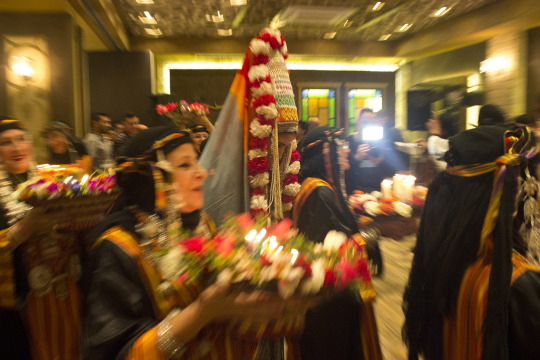
A bride wears the Tishbakh lulu (originally of the Sana'a region) and is accompanied to the hall for her pre-wedding za'afa, a ceremony comparable to the Moroccan henna. Binyamina, 2015.
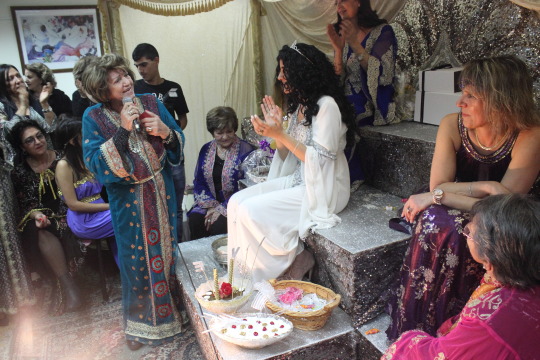
A bride's grandmother sings to her at a Persian henna celebration. Rishon Le Zion, 2015.

A photoshoot for a henna fashion magazine. Ramla, 2015.
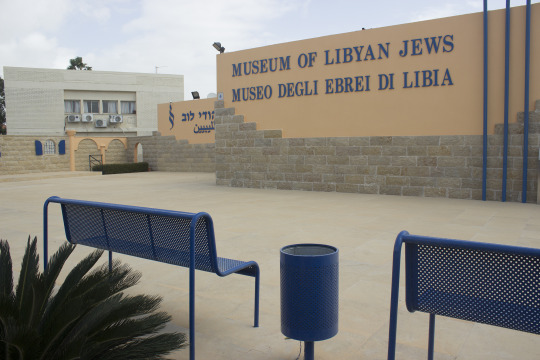
Libyan Heritage Centre, Or Yehuda, 2015.

Or Yehuda, 2015.

Ohel Moshe Yemenite syangogue, Moshav Yinon, 2015.
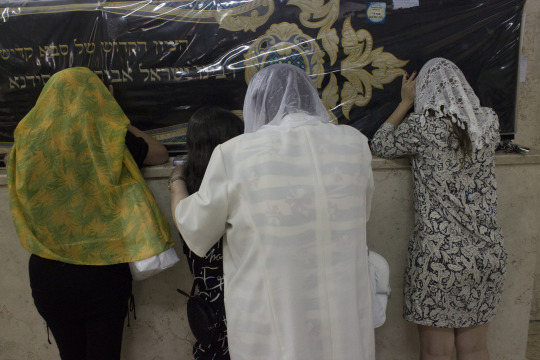
Women pray at the Baba Saleh Tomb. Netivot, 2016.
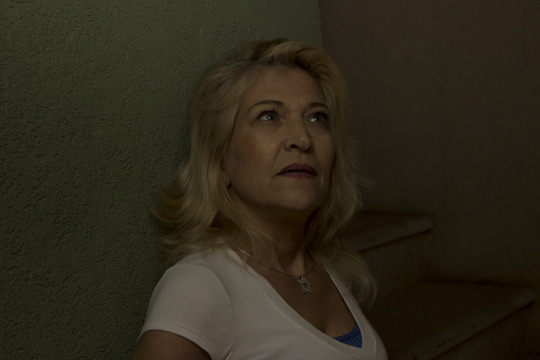
Beit Shemesh, 2014.
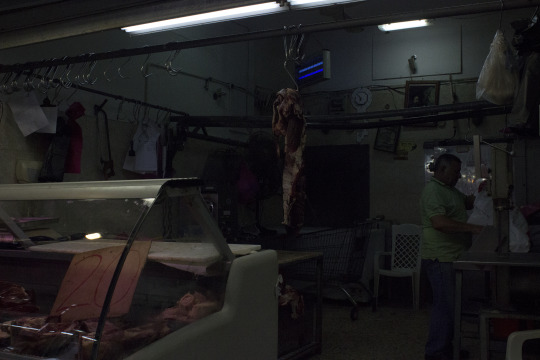
The shouk remains the domain of blue-collar Mizrahim and Palestinians. Carmel Market, Tel Aviv, 2015.
9 notes
·
View notes
Text
1
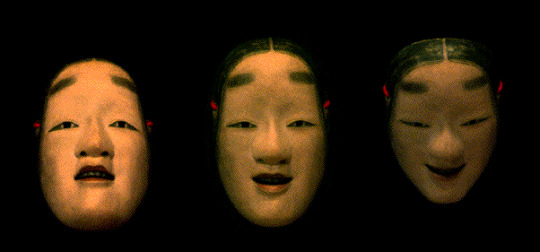
Noh masks are designed to exaggerate expressions at different angles. The actors perform extremely careful tilts and nods of the head to produce these.
It takes years of training to get the motions right.
-
Q: Why is modern art so fucking bad?
A: It doesn’t respect the audience, so it doesn't respect itself.
Obvious answer, next.
Q: Why does a Noh actor have to spend so long practicing?
A:
-
Masks are important. Their practice is nearly a lost art, providing anonymity, pseudonymity, whatever, the internet all but killed them. The ease of a handle incentivizes a particular relation to it. I'm anon, which means I can be me better, They can't chastise me for My Thoughts. But that handle is not you. It's a mask, and it must be respected as such. Tilt the head wrong and slide into the uncanny valley. Of course people respond to one another like demons here. Everyone looks like a demon, they've failed to respect the mask, they present deformation as strength.
Q: Why is modern art so bad?
Interview with an author, any author, take your pick: "I just try to tell the truth. You know, it's subjective, sure, and I'm just trying to connect, to show them how I feel. It's me on the pages, you know."
I can imagine little else with more sneering condescension, with more moral cowardice lurking around the edges and inflicting itself on the audience. It is shameful.
The holy dictum is "Come at the king, best not miss." His retinue will tear you to pieces, watch pack animals converge on the bested challenger.
It is a good thing that the art world dies, that the public abandons it, that literature is left to screeching fools.
The general reaction means that we still have aesthetic instincts. We still see beauty, which means we see its opposite, which means
-
I have no clue how to use tumblr, the UI is terrible, no you's here are the you's here, which I don't need to say because self-selection. This is sounding board for the main task (be on edge instantly), but it's a helpful sounding board. One has to learn to gesture and - if they trust in their gestures - do so publically. Or, we might say: tilt their head in a different way.
Sooner or later, I'm going to have to write about Nietzsche (I'll have to write about capitalism and Marx and markets and Kant, too, but those are different-and-identical matters). This is a shame, because Nietzsche cannot be talked about. One has to assert things, there is no way to back them up, scholars who try to do so are hilarious. "He says this thing and this other thing, there is no way to tell which he means." There is, you have to recognize the tempo, it is obvious when you do, you have to learn to read.
Kid reads Nietzsche and goes full Thrasymachus. The Truth Is There Is No Truth, Just The Will Of The Strong. Wrong, bucko. Swap a few nouns and you have a solid tween advertising campaign, Time's Person of the Year is You. If there's truth there's truth, if there isn't there isn't, we are uncertain, it is premature to determine one way or another. What's certain is that we are lying animals, that we lie to survive and, better, to thrive.
Thrasymachus is survival level, which is appropriate, go back to Will to Power. Reinterpreting base-level nature of humanity as a particular strength of your own, and, worse, as your way to gain power is not a sign of strength. It means you have none, you failed at the goal, your character is not adequate to attain power.
Turn it around, reconsider the scene: Thrasymachus inserts himself in a debate via moral outrage. Socrates, he claims, does the same as the rest of the sophists. He lies, he wins through rhetoric, but his trick is to claim truth. This is unfair, because it lets him win. The problem, according to Thrasymachus, is that all conversations are contests, there is no truth, just strength, which makes the only truth "strength." Wait, go back. "It is unfair because it is a lie that lets him win."
If Thrasymachus's argument doesn't make your skeptometer go nuclear, I don't know what to tell you. Some people find it "a harsh, Machiavellian assertion." Philosophy is beyond them, which makes poetry and fiction well beyond them. Music is presumably dark matter.
We're talking about Nietzsche, which means the first question is "What is the value of Thrasymachus's argument? What role does it play?" Or: what does it mean to claim that the strong are known by their dissimulation, and assert this as the truth? Whether it is or not is "right" is the wrong question, go back to letting Rawls best you, nothing here will help. "Harsh."
Last: Socrates gleefully replies with a gigantic parable which is explicitly false. But it is beautiful. I mean linguistically, it's gorgeous Greek, astonishing Greek. He claims, in the myth, that truth always carries the day, that it leads to the only life worth living. Note how he phrases it, the same way Plato always phrases it, the one time a real master like that slips. Not because he lacks the skill, no. Because it's fun to slip sometimes, it provokes laughter, and laughter is the balm of the gods. The Plantonic phrase is not "This is the truth." It's: "We will be better men for believing this."
Socrates, naturally, wins.
A thousand edgy undergrads scream and moan. They've read the first essay of the Genealogy, maybe even the second (definitely not the third), they know the score: "The game was rigged. Of course Socrates wins, Plato wrote the thing. It's deeply unfair! Thrasymachus was telling the truth, he was right! Socrates is naive, a coward hiding behind 'truth'."
There's a specific Nietzsche term for that reaction. Or, more accurately, the ethical character which predicates the reaction. They won't like it.
-
"The point is to lie beautifully?" Not really, but even if so: that's Plato's claim, not Nietzsche's. See: Strauss.
Nietzsche's claim is harder. Approximation: Aristophanes wrote the Clouds which is theoretically about Socrates. Greek theatre, like Noh, relied on archetypical masks and exaggerated molds of contemporary figures. Tradition tells us that Socrates laughed harder than anyone when the mask was revealed, that he stood up to let all know how fine the mask's craft was. We know also that Plato adored the works of Aristophanes, despite the Apology blaming him for the trial. Socrates dies with a joke; the Symposium gives Aristophanes the prettiest speech. These are all the same as the mask.
-
We are bad readers, but it is fun to talk about philosophy. Taken alone, that justifies it.
It is also good for your soul, and it tells you what that is. Plato would say: bronze, silver, gold. Which? Inaccurate, but funny. Philosophy requires no data, no historical baggage, the argument is right in front of you, there is no other, you simply must read it. It is open to your powers alone, hence its danger.
"You can assert anything in philosophy!" Only if you know how to do it well, which is a self-selecting process, which means that those who can won't. The reverse of that statement: I was conned because I cannot juggle arguments well enough to filter good from bad. The theses of philosophy are not the point, you cannot understand it from second-hand sources because you need to read the argument. No one can tell you what it means because what it means is asserted as economically as possible in the original text. See also: art.
Of course there are truths in the world. That's the point.
Philosophy is open, free, without the "rigor" imposed on physical sciences in precisely the same way a piano is free, open, "cannot be proven or disproven." One reacts to a bad musician viscerally.
Philosophy goes a good deal further, of course. It has, to use Nietzsche's term, "mocking, Dionysian laughter." It lets Thrasymachus tell the truth as hard as he can and - it lets people agree. There is a deep cruelty here. Worse, of course, is the situation of those who can't differentiate between Thrasymachus and Socrates, between them and Plato, between Theaetetus and Gorgias. It puts the bad musician on stage and lets them play. It even claps. See: philosophy departments.
The point of this is humor, of course, which is nothing to scoff at.
"It's all baseless assertion, there's no outside measure of which side is right." Stop telling me about yourself. Jesus, have some dignity.
-
PDF warning, Strauss in a seminar, discussing the Apology and the poor arguments of rigid platonism:
"Now Burnet had the merit to take the Clouds much more seriously than most students. He rightly insisted on the fact that the comedy is of course not a historical report and therefore one must be cautious. The historical report would give us facts and a comedy gives us jokes. And therefore this is one special difficulty—unfortunately he goes beyond this; he says, “quote, Statements of fact are not funny, unquote.”
[Laughter] Now this is a consequence of the fact-value distinction, because “funny” is surely a predicate of value [laughter]. It may be a negative value, but still it is not neutral. And I do not know whether Burnet knew it was a consequence of the fact-value distinction, but in fact it is. Now let us briefly consider this consequence or implication of the fact-value distinction. Is it true, as Burnet asserts, that statements of fact are never funny? Is it true? It would be true if there were never funny facts. [Laughter]
We all know that there are funny facts."
5 notes
·
View notes